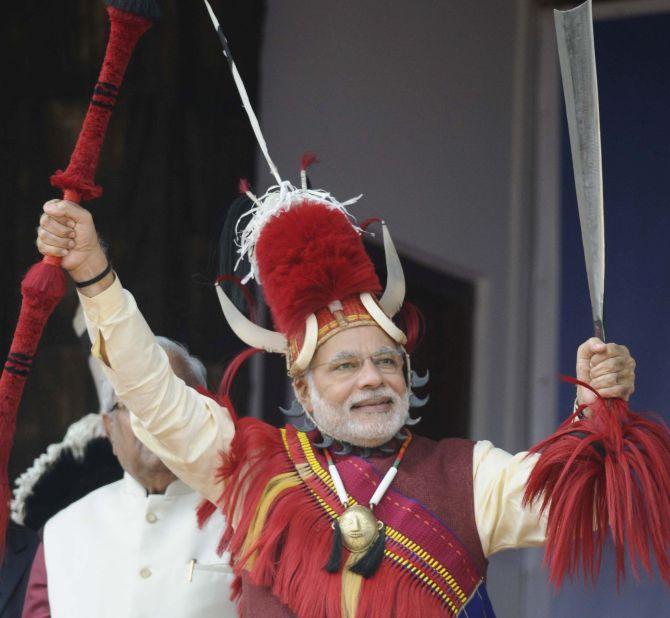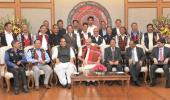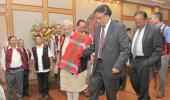'If the NSCN-IM is cold shouldered, chances are that it will slip back into insurgency,' caution Sandeep Pandey, Meera Sanghamitra and Babloo Loitongbam.

Thuingaleng Muivah, the supreme leader of the National Socialist Council of Nagalim (Isak-Muivah) says Nagaland may be weaker in the material sense but it is strong in politics.
No wonder, the organisation which started of as an insurgent group was able to engage the Government of India in a process of dialogue for 22 long years after a ceasefire agreement in 1997, now as a parallel government of which Muivah is the Ato Kilonser or prime minister.
Even after the aspirations of the people of Jammu and Kashmir of maintaining a certain degree of autonomy with a separate constitution and a flag have been quashed by the Narendra Damodardas Modi government by its decision on August 5, 2019, Muivah continues to keep alive his vision for a shared sovereignty and enduring relationship of peaceful co-existence with India, inked in the framework agreement signed on August 3, 2015.
He has good reasons to be hopeful.
Unlike J&K, no instrument of accession was signed by then Naga rebel leader Angami Zapu Phizo with the Government of India.
Nagaland was first made part of Assam by the British and then by independent India with force.
The Nagas resisted both times and there was much violence from all sides.
But the Nagas never surrendered and believe that the ongoing dialogue will result in a political solution.
Muivah asserts that Nagaland has never been under any foreign rule either by consent or by conquest.
Jawaharlal Nehru sent the army into Nagaland. According to Muivah, Nehru never respected the Nagas as human beings.
It was much later when then prime minister P V Narasimha Rao met with Isak Swu and Muivah in Paris, he agreed that dialogue would be held without any pre-condition, at the highest level and outside India. He also acknowledged the unique history of the Nagas.
Subsequently, then prime minister H D Deve Gowda met Isak and Muivah in Bangkok. He wanted the Nagas to accept the Indian Constitution, which was not agreeable to the Nagas. Muivah suggested that the two parties should go separate ways.
Two years later, the Government of India admitted that the Nagas were never formally under Indian rule and a unique solution to their problem was required.
It was only after this that the concept of shared sovereignty was floated.
After talks with then prime minister Atal Bihari Vajpayee in Amsterdam the NSCN-IM leadership decided to return to India and continue the process of dialogue with the Manmohan Singh government.
The Modi government declared with much fanfare that an agreement had been reached with the NSCN-IM leadership only to encounter the roadblock of a separate constitution and a flag for Nagaland.
Having taken away the constitution of J&K, which incidentally mentioned that J&K was an integral part of India, and its flag as part of the narrative of 'One Nation, One Constitution', the Bharatiya Janata Party-led government is in a bind with respect to the Naga demand.
Muivah is resolute about the demand for a separate constitution and flag which he describes as core issues.
The response of the interlocutor in the dialogue process, now Nagaland Governor R N Ravi has been to bring on board another stakeholder since 2017, Naga National Political Groups, a conglomerate of seven organisations.
This is an attempt to counterbalance the NSCN-IM, which was the only Naga group with which Ravi signed the framework agreement in August 2015.
He should learn from history that when the government reached an agreement with the Naga People's Convention leaving out Phizo's Naga National Council, it didn't resolve the issue then.
If the NSCN-IM is cold shouldered, chances are that it will slip back into insurgency with the possibility that the NSCN-Khaplang, presently dormant in Myanmar, will also get reactivated.
From the J&K experience, even though the government is still not willing to admit its mistake, it should know that imposing any decision against the wishes of the people will not help solve any problem.
Contrary to the government's claim of total integration of J&K with India, the alienation is now complete.
The J&K kind of solution is untenable.
The violence by the State, imposition of the Armed Forces Special Powers Act and counter-violence by the insurgent groups is an unequal terrain, which has been a site for major and incessant human rights violations, as the north east has direct experience of it.
This is a cost we can ill-afford.
Instead of a separate constitution and flag, it will be better if the government concentrates on thrashing out the intricacies of competencies which the NSCN-IM has worked out in detail.
The NSCN-IM envisions a governance structure in the form of a pan Naga apex tribal body Hoho for a period of six years with representatives from each village and regional territorial councils for Naga areas in Manipur, Assam and Arunachal Pradesh, having realised that it may not be possible to integrate Naga inhabited areas in these three states with present day Nagaland into a greater Nagalim.
Already, the Coordination Committee on Manipur Integrity has given a call to the people of Manipur to resist a final Naga accord if it challenges the territorial integrity, economy, cultural practices and administrative set-up of Manipur.
The government should not rush into a solution by declaring deadlines to ensnare itself like in J&K, but should patiently involve all stakeholders from within and outside the state of Nagaland without marginalising the NSCN-IM and evolve a solution with a peaceful dialogue process to the satisfaction of all.
The NSCN-IM must acknowledge that even though it may have been the only force to reckon with in the beginning, there are now others whose sensitivities will have to be kept in mind.
For example, the Kukis, another tribe, enagaged in fierce tussle with the Nagas in the Manipur hills are unlikely to accept Naga dominance over their areas.
Lammingthang Kipgen, president of an organisation of Thodous, a Kuki community, has expressed his apprehension to the interlocutor for Indo-Kuki talks.
While it is likely that groups within and outside Nagaland are being projected at this time by the government to blunt the edge of NSCN-IM demands, it is also a fact that societies like Manipur are an ethnically plural society which have withstood the test of time for many millennia.
They are unlikely to acquiesce to any arrangement to part with their resources and polity at the exclusion of other stakeholders in their society.
The government and NSCN-IM must be completely transparent in their approach and must take into confidence all genuine political formations, civil society and ethnic groups co-habiting the geographical area in which a collective polity has evolved over time.
There was a time when Naga leaders were impatient and were willing to go back to Europe leaving the dialogue process open ended. Now the government seems to be in some kind of urgency.
The Modi government would do well to resist the temptation of self-congratulatory grandeur in deciding the fate of Nagaland without culmination of proper consultations.
In the name of an accord if the fragile ethnic balance of the region, which has a history of violence, is not handled sensitively, it can potentially lead to an ethnic implosion.
Sandeep Pandey is associated with the Socialist Party (India). Meera Sanghamitra is with the National Alliance of People's Movements. Babloo Loitongbam is a human rights activist from Manipur.











 © 2025
© 2025